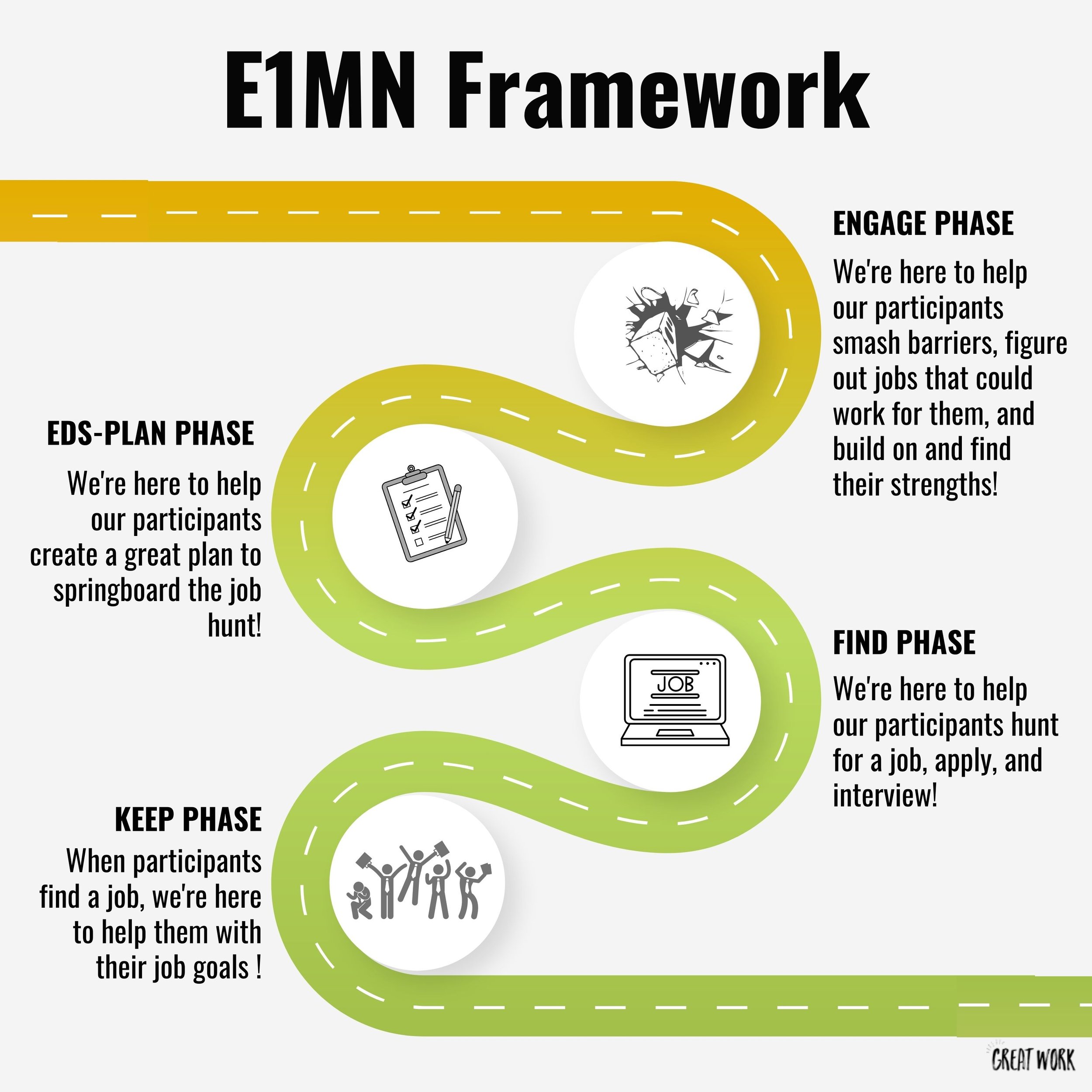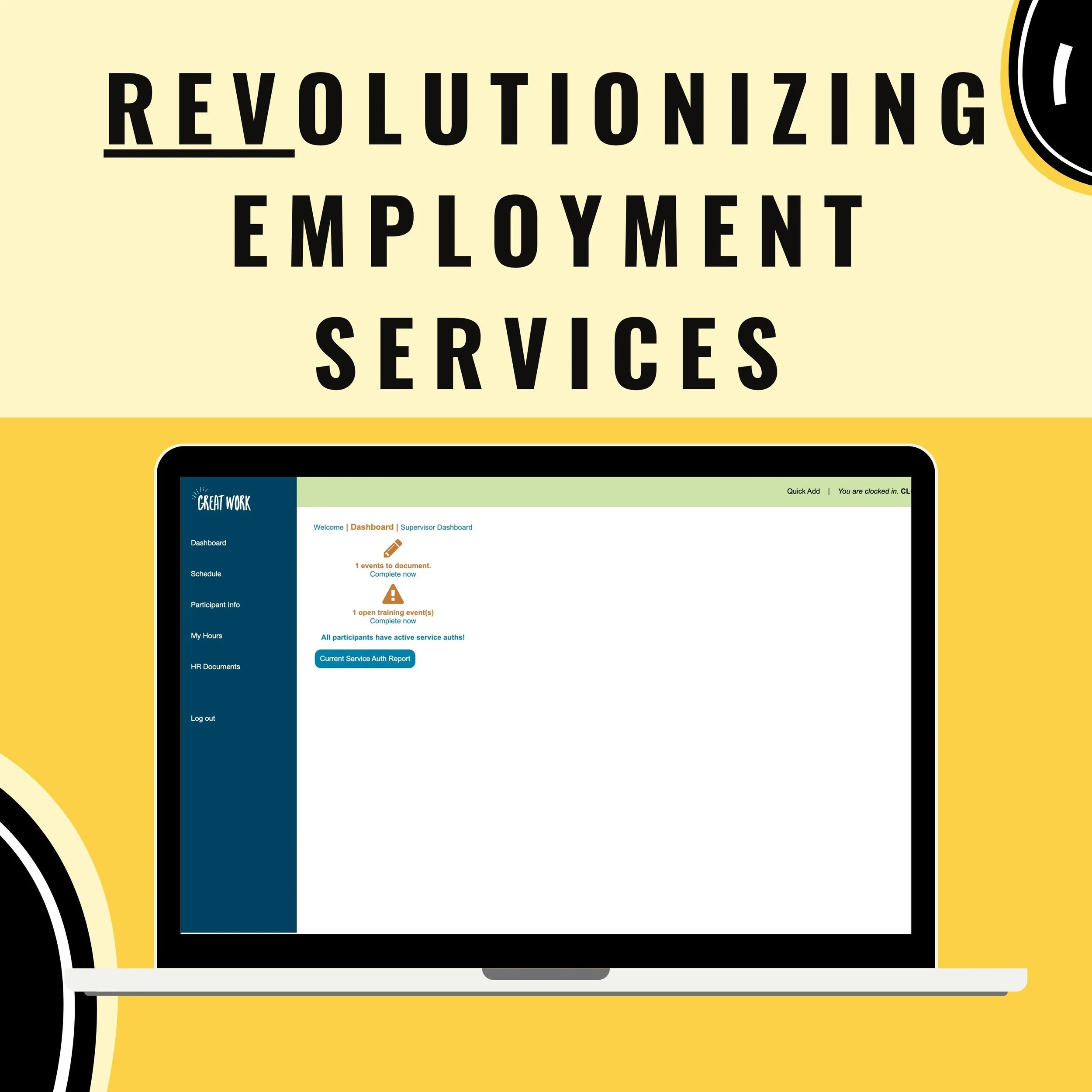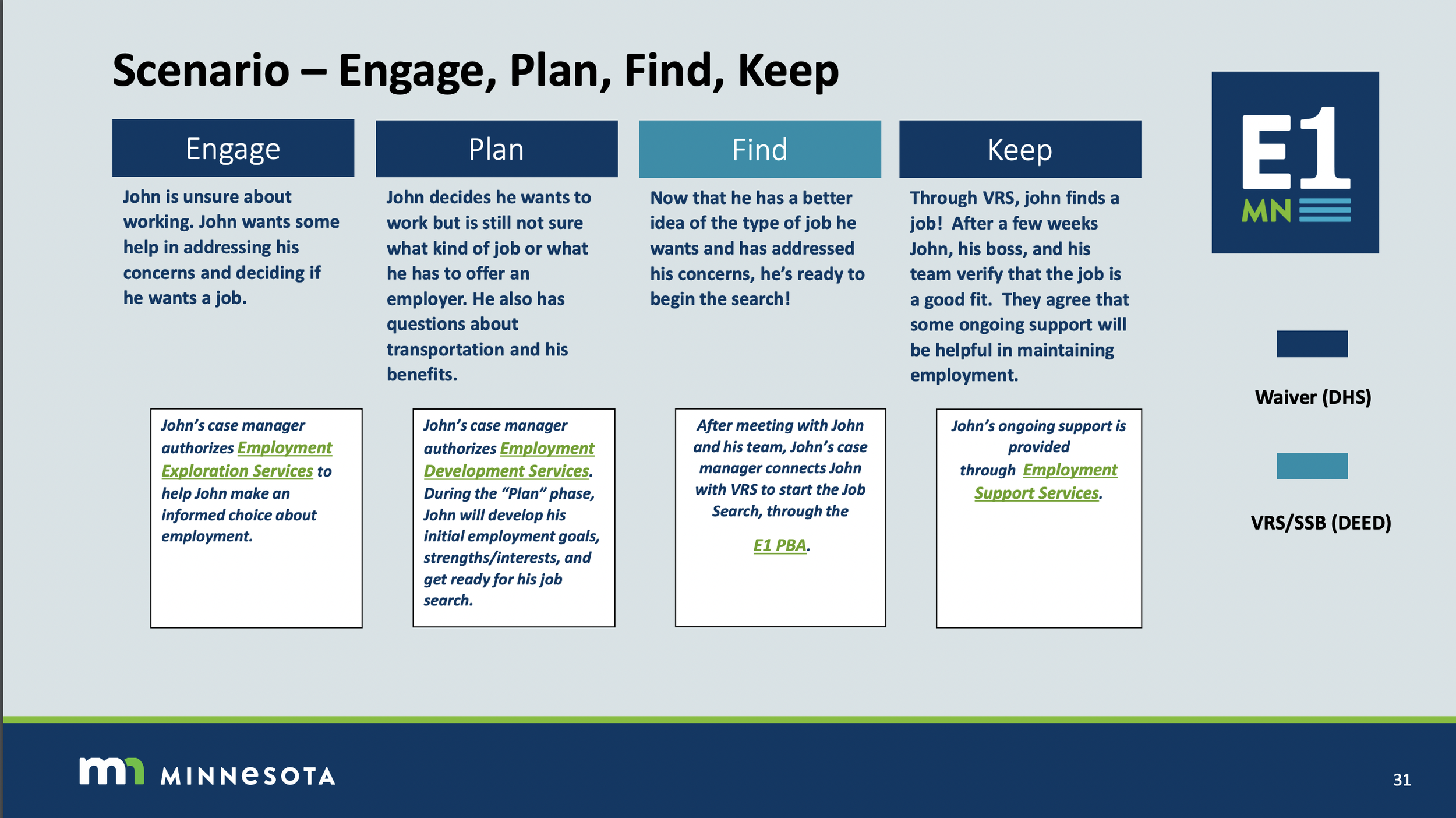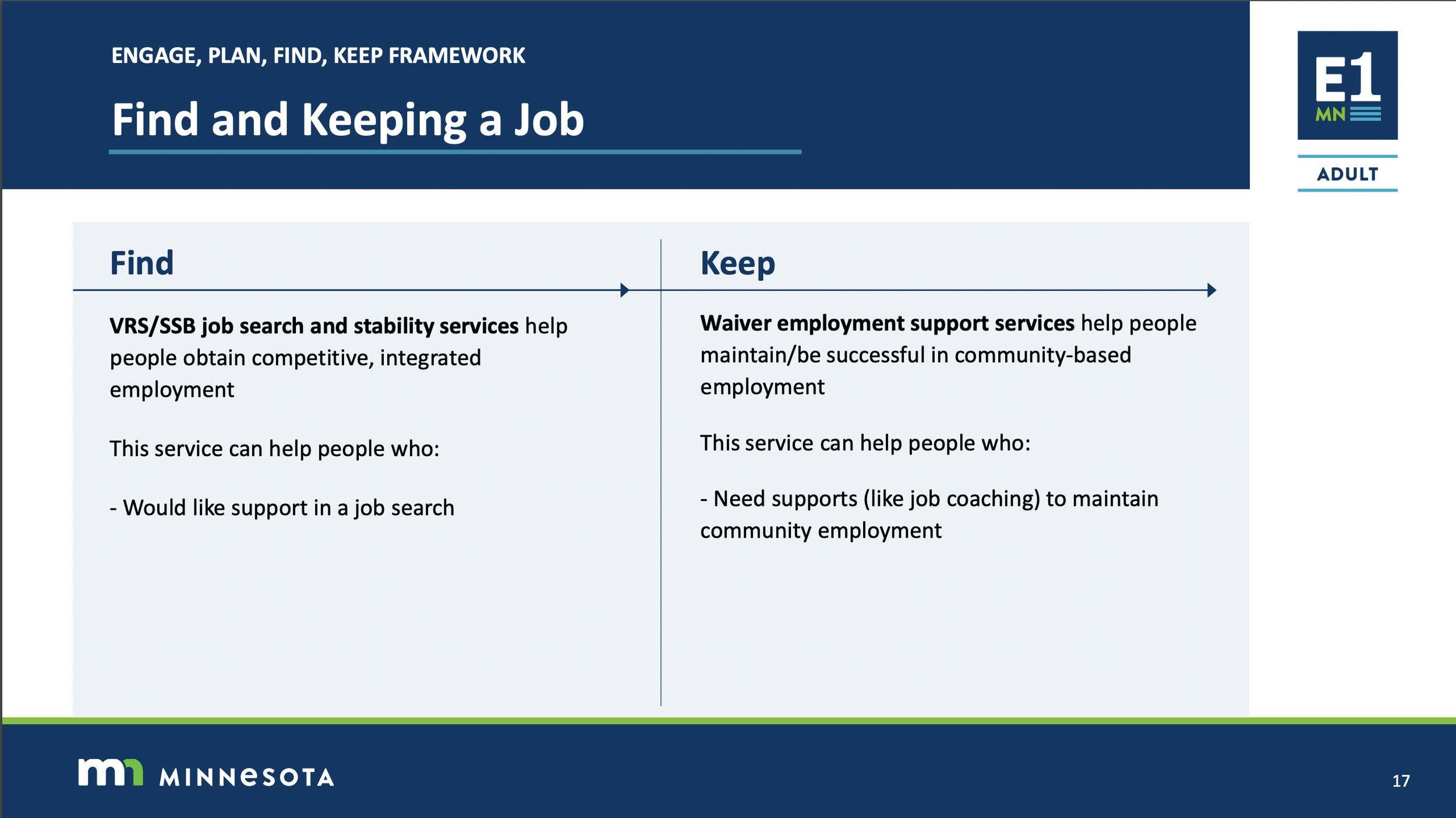
Employment Services Overview
Great Work’s Resource Site
The E1MN Framework
The Employment First Minnesota Framework (E1MN) is designed to help make sure that Great Work helps our participants explore employment, plan for employment, find a job, and keep a job that is a perfect fit for them! Click below to learn more about each phase:
Other Great Work Services
Great Work provides these services in partnership with Vocational Rehabilitation Services.
-
We help our clients find a great job in the community that is a perfect fit for their strengths!
Referred individuals must be looking for a long-term, permanent job.
Referred individuals must be looking for a permanent and long-term job.
Referred individuals should have a resume, template cover letter, complete sample application with established references, and no need for interview practice.
-
Great Work currently does not offer job coaching services (someone always present while an individual is working). There may not be a staff member available to take on the case, but feel free to reach out!
Initial Support: Great Work will provide 1-1 constant on-the-job support for the first 30 days.
Fading Support: At 30 days, we’ll assess the need for continued support and will fade back if appropriate.
Transportation: Great Work cannot provide transportation to/from the job. Great Work can wait for someone’s ride with them if approved by VR in advance.
Great Work absences: There may be times when our job coach is out due illness, emergency, paid-time-off or Great Work’s holiday schedule conflicting with that of the employer. We will alert the participant, employer, VR counselor, and family asap when our job coach will be out. We will attempt to find coverage internally within our team but if we cannot, we will explore a natural support from family, friends of other providers or a natural support from the provider.
Participant absences: Please alert your job coach ASAP if you will be absent from work for either a planned day off or unexpectedly. Our job coaches rely on their income from this job and if you can’t work, they usually can’t work either.
Schedule changes: We cannot guarantee that we will be able to accommodate work schedule changes. We will try our best to accommodate schedule changes when we can, but our job coach may not be available during the new schedule. If a participant’s hours are cut at work, Great Work will often fill the lost hours for our job coach with other responsibilities or support for other participants. If hours are added back to the participant’s schedule. We cannot guarantee that our job coach will still be available to provide support during those times.
Job coach departure: In rare situations, our job coach may decide to leave Great Work. When they do we will try our best to find coverage internally within our team and find a replacement job coach. However, this is not always immediately possible and can cause a gap in coverage. In these situations, we will explore the possibility of utilizing natural supports while we work on finding coverage.
-
We help our participants collect experience on a sample application, assist with resumes and cover letters, and practice interviewing!
-
We help our participants explore employment through a great stepping stone job and will help build their employment experience.
Through Work Experience Services we can help them search for a job through posted job openings in their community, or we can arrange an individual, time-limited job to help you determine their interest in a particular kind of work. Occasionally these short-term customized experiences lead to permanent job offers!
Quick Links
-
E1MN: Engage Phase
-
E1MN: EDS-Plan Phase
-
E1MN: Find Phase
-
E1MN: Keep Phase
-
IDT Meeting: Annual
-
IDT Meeting: Waiver Intake
-
IDT MEETING: 45-Day
-
IDT MEETING: Placement Plan
-
6790
-
Benefits Analysis
-
Business Outreach
-
Employer Support
-
Interest Inventories
-
Interviewing
-
Job Hunting
-
Ongoing Support
-
Resume and Cover Letter
-
Skill Building
-
Task Analysis
-
Transportation Plan
-
Workplace Accommodations
REV
REV is Great Work’s information database. We use this to input documentation, participant scheduled events, update participant information, and time-keep. Log-in using the “Team Login” button in the right hand corner.
-
Quick add entries should be used to record all work performed for or with participants between scheduled events. All work done with or for a participant that is not an event, should be entered as a Quick Add.
Examples of what to categorize each entry as is located in “HR Documents” in REV.
-
Participant Events should be created for anything that is scheduled before it is completed. This includes:
All team meetings (Placement Plan Meetings, Intakes, 45-Day Meetings, 60-Day Meetings, Annual Meetings, or any other variety of team meeting!)
Any pre-scheduled check-ins or activities with a participant. This includes phone calls, remote meetings, and in-person meetings.
Any pre-scheduled interviews, tours, informational meetings, or other in-person activities with a participant.
Any pre-scheduled check-ins, meetings, calls, or activities with an employer or potential employer.
Any pre-scheduled check-ins, meetings, or calls with a participant’s case manager, VRS counselor, another provider, guardian, or other team member.
*Events should be entered into REV as soon as they are scheduled!
*A good general rule for determining whether something should be entered into REV as an event is if it was scheduled in advance, if it was, it should be an event!
-
You save them in the Tools/Activities section!
Additional Information
-
Individuals receiving Waiver Services (Employment Exploration, Employment Development, or Employment Support) will be funded in one of the following ways: Straight Waiver, CDCS, or CEED.
Straight Waiver
6790 required before or at intake, annual, and when there is a service change.
Case manager arranges services.
Services can be authorized, ended, or changed anytime throughout the year.
Once services are started for a person, they renew annually.
Entries are submitted directly to the State for payment.
CDCS (Consumer Directed Community Supports)
6790 is not required (although some case manager will request one – so we’re going to send them for everyone).
The person is allotted an amount of money based upon their assessed needs to spend on the services.
Person and/or their guardian works with their Support Planner to create a CDCS Plan which outlines the services they’ll get and the amount of money allotted for each service.
Each person selects a Fiscal Management Service or FMS (previously called a Fiscal Support Entity or FSE). The selected FMS is a company that holds their plan money and pays providers.
Invoices are prepared and submitted to a person’s FMS each month.
Plans are updated at least annually but can be changed anytime.
CDCS and CEED plans are often referred to as “self-directed” plans because their person and/or their guardian decide how to spend their service budget.
Community Employment and Engaged Day Services (CEED)
Available only to service recipients funded by Dakota County.
6790 is not required (although some case managers will request one).
The person is allotted an amount of money based upon their assessed needs to spend on the services.
Person and/or their guardian works with their case manager to create a CEED Plan which outlines the services they’ll get and the amount of money allotted for each service.
Each person selects a Fiscal Management Service or FMS (previously called a Fiscal Support Entity or FSE). The selected FMS is a company that holds their plan money and pays providers. Invoices are prepared and submitted to a person’s FMS each month.
Plans are updated at least annually but can be changed anytime.
CDCS and CEED plans are often referred to as “self-directed” plans because their person and/or their guardian decide how to spend their service budget.
-
E1MN PBA
Authorization will always be for 4 milestone payments. Payment will be made after each milestone is reached.
*If any support is needed after the person begins a job, the person’s waiver case manager should authorize Employment Support.
An invoice and required documentation for each milestone is all that is required for payment.
General PBA
Authorization will always be for 3 milestone payments. Payment will be made after each milestone is reached.
*If any support is needed after the person begins a job, VRS should authorize job coaching (or another service).
An invoice and required documentation for each milestone is all that is required for payment.
REV tracks milestone payments and prompts !
Unit-Based General VR Services
A service authorization is always required before a service can be provided!
Service budgets renew quarterly but can be replenished, if needed, before the end of the quarter.
Authorizations will end on one of the following dates:
March 31
June 30
September 30
December 31
An invoice and an accompanying narrative report of work done on each day must be submitted together.
*Drive time must be authorized just like any other service!
Pre-ETS
A service authorization is always required before a service can be provided!
Service budgets renew quarterly but can be replenished, if needed, before the end of the quarter.
Authorizations will end on one of the following dates:
March 31
June 30
September 30
December 31
-
We need the Find Phase to be as efficient as possible. If you take 20 minutes to find a client a job, Great Work receives the same amount of reimbursement as 300 hours.
You should only be job searching and applying in this Phase. Items like cover letters and resumes should be completed in EDS – Plan.
-
Waiver: Drive time is included in the service meeting entries and you don’t need to create separate Travel entries. Just include the time it took you to travel!
VRS: Drive times is not included in the service meeting entries for Unit-Based Services (you don’t need Travel authorizations for PBAs). You would need to get a Travel Authorization from VRS to get travel time reimbursed.
Waiver vs. VRS
Still a little confusing? Think about it in simple terms.
When we get a Waiver participant that just means we’re helping a waiver case manager.
When we get a VRS participant, that just means we’re helping a VRS counselor.
You are the keeper of your client’s experience with Great Work and they’ve put their trust in us to help them achieve their goals!
Until they are all getting 10/10, A+ services, there is always room to do more to help them succeed and reach their goals or reach them faster.
When you feel you’ve run out of things to do, pour over your client list to identify how you can enhance what we’ve been able to do with them so far.
Employee Notes
-
Our Vision
An inclusive and equitable world for all of us, with or without disability.
Our Mission
To help businesses and people with disabilities realize and enjoy the benefits of inclusive employment.
Our Values
Great listening
We listen to understand and not to respond.
Teamwork
We make extraordinary efforts to help and support our clients and each other.
Client Focus
We empower, guide, and support our clients to reach their goals.
Inclusion
We want a diverse workforce and an environment where everyone can thrive and bring their whole self. We always bring a humble and curious approach to our inclusion efforts.
Accountability
We deliver on our commitments.
Creativity
We infuse our work with creativity. We think outside the box to discover and implement creative, innovative solutions.
Our Beliefs
We believe work is possible for everyone.
We believe diversity has tremendous value and everyone wins when people with disabilities are included.
We believe our work is important. We bring our best selves and our best efforts to our work.
We believe conflict, problems, and mistakes have value. They show us what isn't working and give us an opportunity to try something new. We focus on solutions, not problems.
We believe everyone's contributions at work should be compensated fairly and everyone should earn at least minimum wage.
-
How can I contact my manager or the HR Department?
Their contact information is located on the staff contact list in REV and on the front page of SharePoint.
Where is the employee handbook?
It’s located inside REV in HR Documents.
Where are client folders?
They are located in GWES_Team in SharePoint.
-
Service-recipient
Our service recipients are our most important customer. Our aim is to help them reach their employment goals.
Guardians and families
Guardians and families are very important customers. They can provide invaluable insight into working with our clients AND it’s important to bring your own fresh perspective to each individual we work with. Sometimes families will underestimate our service recipient or will assume that they are only able to do a handful of job that they have seen other people with disabilities do in the past.
Case Managers
Case managers refer our waiver clients to us and secure funding for our services, so they are also very important customers. Case managers are overworked, and we should assume they are doing their best and look for ways to help them out.
Vocational Rehabilitation Counselors
Vocational Rehabilitation (VR) Counselors refer our VR clients to us and secure funding for our services, so they are also very important customers. VR Counselors are overworked, and we should assume they are doing their best and look for ways to help them out.
Employers/Businesses
Employers and businesses are essential to our clients’ employment success. Some businesses will be very inclusive and open to working with and supporting our clients and others will not be. Regardless of where they are right now, we want to be a positive partner in their inclusion journey. When we have positive relationships with our clients’ employers, we are able to be so much more effective in our work.
-
Person-First Language
We model person-first language to our many contacts in the community from parents to employers. As such we try to always use person-first language. Person-first language means putting the person before the disability. Here are some examples:
Person with a disability (as opposed to ”disabled person”)
People with disabilities (as opposed to “disabled people” or “the disabled”)
Person who uses a wheelchair (as opposed to “wheelchair bound”)
*There are some exceptions to this. Some people who have Autism prefer to be referred to as “Autistic” as a way of reclaiming and celebrating their identity, ie “Jane is Autistic”. Some people on the other hand, will prefer traditional person-first language, ie “Jane has Autism”. When in doubt, follow the person’s lead or ask what they prefer.
Honoring the Individual
Don’t make sweeping assumptions about a person based on their diagnosis. Each individual we serve is unique. Their disability may present differently than that of someone else with the exact same diagnosis. They may also have preferences that are unique to them about how we should talk about or support their disability.
Asking before Assisting
Don’t be afraid to ask how you can assist. If someone tells you they “freak out” when they’re anxious, don’t quietly cross your fingers and hope they never feel anxious in your presence. Instead ask something like, “what does it look like when you freak out?” Or “How would I know that you’re feeling anxious?” Also be sure to ask something like, “What would be most helpful for me to do when you freak out?” or “What do you need from me if this happens?” Don’t be afraid to ask the questions you need answered in order for you to feel confident and safe in your work.
Prior to assisting someone who is using a walker or wheelchair, ask them if you can assist them. For example, before going out of your way to open the door, ask if they’d like that kind of assistance by saying something like, “Would you like me to grab the door for you?” Prior to touching someone’s wheelchair, always ask for their permission. For example, “Is it okay if I help push your chair through the doorway?”
-
We work with vulnerable adults who often have others formally or informally to help them make decisions. Often our clients will have a guardian, power of attorney, or conservator.
Guardian
A guardian is someone a court appoints to make decisions on someone else’s behalf. A familiar guardian is someone related to our client while a corporate guardian is an unrelated, professional guardian.
Power of Attorney
A Power of Attorney is someone that an individual has appointed to make decisions on their behalf (either generally to make all decisions or specifically about certain areas)
Conservator
Has the power to make decisions about someone’s finances.
-
Our services are funded through a local county (via property tax dollars) or through a waiver program where the cost is shared 50-50 between the State and the federal government. Anytime someone is on a waiver program, their services are funded through the State and federal government.
Waivers (CADI, DD, BI)
Straight Waiver
Straight waiver means that someone’s services and their respective funding are coordinated and managed by their case manager. Often this is referred to as just a “waiver” instead of straight waiver which just differentiates it from the CDCS Plan option of the CADI and DD waivers. The three waiver programs that our service recipients are funded through are the Community Access for Disabled Individuals (CADI) waiver, the Developmental Disability (DD) waiver, and the Brain Injury (BI) waiver.
CDCS Plan
Individuals who receive a CADI or DD waiver have the option to do a Consumer-Directed Community Supports (CDCS) Plan. Individuals who make this election get assigned a set amount of money each year that they can use to purchase and coordinate the services they choose. When someone has a CDCS plan, they will have a Service Planner who will help them write and manage their plan. Most often it is a person’s parent, guardian, or family member who works with the Service Planner to write and manager the person’s plan on their behalf.
CEED Plan (Dakota County)
When someone does not qualify for a waiver but does need services, Dakota County will authorize them to receive a Community Engagement and Engaged Day (CEED) Plan. Similar to CDCS, CEED plans are directed by the individual (and/or their family and guardian) and allot a set amount of money that the individual can use to purchase services of their choosing. Unlike CDCS, CEED plans are written by someone’s case manager instead of a Support Planner.
Anoka County
When someone living in Anoka County does not qualify for a waiver, but does need services, Anoka County pays for services directly without any kind of plan.
-
Case managers, either contracted or directly hired by the County, refer clients to us. Prior to getting a case manager, our clients will have had an assessment done by their county to determine their eligibility for services. Often these assessments are prompted by a teacher or pediatrician when someone is young, however, they can be done ant any point regardless of age.
-
Disability service providers, like us at Great Work, are regulated by the Minnesota Department of Human Services. We are licensed as a Home and Community Based Services provider and need to be in compliance with all relevant rules and regulations most notably Minnesota Statutes Chapter 245D.
-
In our field, responding to calls and emails in about 1 business day is the norm. Often you will be able to respond the same day and sometimes you may not be able to respond until 2-3 business days. Aim to get back to people by the end of the next business day.
-
You will be provided a cell phone by Great Work. This cell phone is the property of Great Work and should be used for work purposes only. At the end of your employment here, you will need to return you cell phone to Great Work. You are welcome to keep your cell phone on during times you are not working or you are welcome to turn your phone off during times you are not working. You are expected to keep up with voicemails and text messages that you receive and respond within a timely manner during your typical work hours.
-
We use several documents here at Great Work. Some documents help us achieve our purposes and some are required by Statute.
We document our time and client progress in a documentation software called REV.
Required by Statute
The documents we prepare and maintain for each service recipient that are required by Statute include:
Individual Abuse Prevention Plan (Part of our Annual Plan)
Coordinated Services and Support Plan Addendum (Part of our Annual Plan)
Self-Management Assessment (Part of our Annual Plan)
Release of Information
Admission Record
Progress Report Reviews
Great Work Documents
We use a handful of employment-related documents to help us provide great services to our clients. These documents are locations within each client’s folder in the sub-folder “GW_Employment_Documents”. You can also access printable versions of each document outlined below in the “Printable Documents” folder and in REV.
-
Work-related driving is reimbursed at $0.50/mile with the exception of commute time which is not reimbursed and is defined in the company’s Mileage Policy. Mileage should be recorded REV within 24 hours.
-
Meeting Attire
Video Meetings - Internal Meetings
Always dress appropriately, but feel free to come as you are to Great Work zoom meetings.
Video Meetings - External Meetings
Your appearance at external zoom meetings should be appropriate and should convey the message that you are ready to bring your full attention to the meeting. Appropriate workout attire is fine but do not wear pajamas to these meetings.
Searching, Work site visits, Team meetings
Dress in clothing that is appropriate and allows you to do your work. You may choose to wear clothing that ranges from casual to professional. Jeans are acceptable. “Comfy” clothing like sweatpants and pajama pants are certainly acceptable when working from home, but should not be worn when representing Great Work to clients or businesses. Feel free to dress casually and wear shorts when out on walks with clients or when meeting with them outdoors.
-
Employee Email Accounts
You will be provided with an email account by Great Work. While it is not part of our standard practice, you should be aware that we could access your email account at any time.
Create an “away” autoreply anytime you will be off work for longer than a day or two.
Client Email Accounts
You will help clients create email accounts that should be used only to communicate to employers on the job searchers behalf.
These should be created very soon after intake, as you’ll include this email address on applications and will share it with employers.
Ask for permission from clients at intake to create these email accounts. Give clients the option to share the login information so they can check them too, if they wish. However, discourage them from deleting any messages or reorganizing without notifying you first.
-
Make sure you’re able to meet your clients’ needs and if a conflict between your schedule and that of your clients consistently prevents you from meeting their needs, inform your supervisors so other options can be explored such as having another Employment Case Manager serve that client.
You must work the majority of your workday between the hours of 8 AM and 4:30 PM.
You may be asked to keep your supervisor and the team informed of your typical work schedule.
You may take time off in the middle of the day and work early in the morning, in the evenings, late at night, or on the weekends as long as you fulfill your billable and hourly requirements. Be aware that neither you nor your coworkers are expected to respond to emails, calls, or texts outside of their normal working hours. You are expected to work on 5 days each week.
Being a GREAT Employment Case Manager means…
You’re entering a field where you’re interacting with and supporting other people! There’s sometimes no “right” answer.
It’s about thinking of and pitching creative ideas, taking risks, trying new things, learning from mistakes, and giving person-centered service!
-
Being person centered means treating others with dignity and respect and empowering them to set and reach their own personal goals.
A person-centered approach recognizes the right of individuals to make informed choices, and take responsibility for those choices and related risks.
This doesn’t mean saying yes to every request. We want to make sure our conversations and activities are employment related and within our scope. We want to positively redirect if things get off track.
We’re here to be a great guide while our participants embark on their employment journey.
Definition from: https://ddsd.vermont.gov/person-centered-thinking#:~:text=Benefit%20to%20Individuals%20%2D%20Being%20person,those%20choices%20and%20related%20risks.
-
Be that friendly face that your participant is excited to meet with!
Try to have a pleasant expression on your face and have a positive attitude whenever appropriate.
When talking on the phone, try to make yourself smile. It may feel crazy, but the person on the other line can feel the warmth.
-
We want to be a respectful advocate to the individuals that we serve. We want to empower them and support their choices… even if it’s a risk or others may not believe in them.
-
Be patient with your participant. Sometimes things may take a little bit longer to be understood or executed… and that’s okay!
Patience doesn’t just end at
-
Here are some resources for building rapport and communicating with your clients!
It’s trial and error! Communication is going to look different for everyone. You might have to get creative and try something different.
It’s okay to not know how to communicate with every person! You can ask your client, their case manager, their guardian, or family members. It’s okay to ask questions.
Communicating with people with disabilities: Ask Me First
https://www.youtube.com/watch?v=VH0To4kXwfs
Step By Step Guide: Working with clients with Intellectual disability
http://idrs.org.au/s32/_guide/p040_5_1_WorkingWithID.php - .Y8BaLuzMK3I
Care Workers: How to Build Rapport with New Clients
https://www.homecareaustralia.com.au/post/care-workers-how-to-build-rapport-with-new-clients
Communication with people with intellectual disabilities in the counseling context
https://learn.livingwell.org.au/mod/page/view.php?id=238
Communicating with people with learning disabilities
https://www.youtube.com/watch?v=TPDxa7NzLCY
How can I communicate better with people with learning disabilities
https://www.youtube.com/watch?v=wuLAQOHFn2U
-
Don’t let the word ‘creative’ be a barrier. Any idea is a good idea. We’re all about expanding options.
A good way to get started is to think of a problem or barrier that an individual may be facing. Then start “Google”ing and see where inspiration hits!
Time spent brainstorming can be documented for indivudals served.
-
Sometimes family members or case managers may be the best informant.
E1MN Overview from DHS








